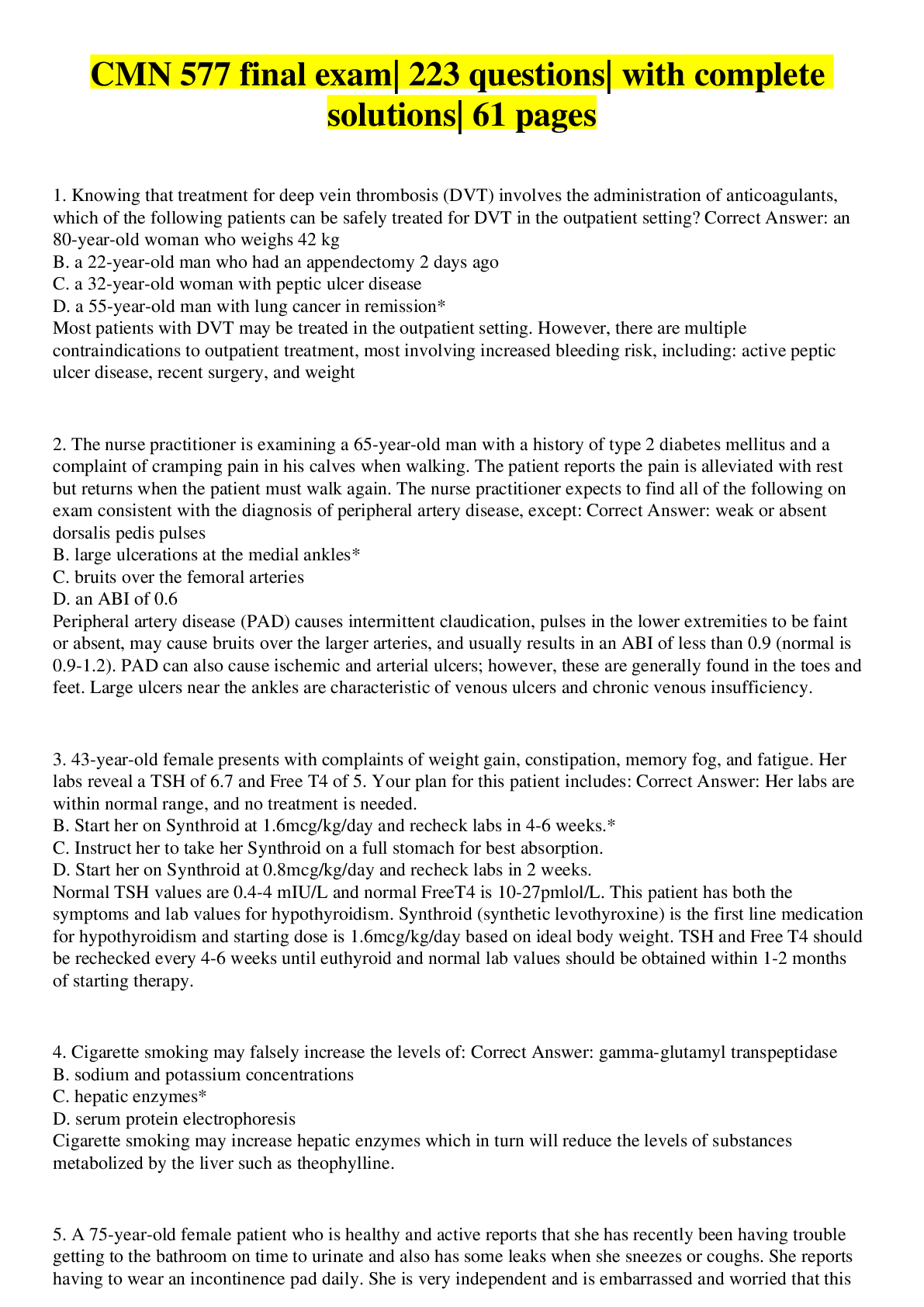Health Care > EXAM > CMN 577 final exam| 223 questions| with complete solutions| 61 pages (All)
CMN 577 final exam| 223 questions| with complete solutions| 61 pages
Document Content and Description Below
1. Knowing that treatment for deep vein thrombosis (DVT) involves the administration of anticoagulants, which of the following patients can be safely treated for DVT in the outpatient setting? Correct... Answer: an 80-year-old woman who weighs 42 kg B. a 22-year-old man who had an appendectomy 2 days ago C. a 32-year-old woman with peptic ulcer disease D. a 55-year-old man with lung cancer in remission* Most patients with DVT may be treated in the outpatient setting. However, there are multiple contraindications to outpatient treatment, most involving increased bleeding risk, including: active peptic ulcer disease, recent surgery, and weight <55 kg for males and <45 kg for females. Lung cancer or any other cancer that does not involve brain metastases is not a contraindication for outpatient treatment. 2. The nurse practitioner is examining a 65-year-old man with a history of type 2 diabetes mellitus and a complaint of cramping pain in his calves when walking. The patient reports the pain is alleviated with rest but returns when the patient must walk again. The nurse practitioner expects to find all of the following on exam consistent with the diagnosis of peripheral artery disease, except: Correct Answer: weak or absent dorsalis pedis pulses B. large ulcerations at the medial ankles* C. bruits over the femoral arteries D. an ABI of 0.6 Peripheral artery disease (PAD) causes intermittent claudication, pulses in the lower extremities to be faint or absent, may cause bruits over the larger arteries, and usually results in an ABI of less than 0.9 (normal is 0.9-1.2). PAD can also cause ischemic and arterial ulcers; however, these are generally found in the toes and feet. Large ulcers near the ankles are characteristic of venous ulcers and chronic venous insufficiency. 3. 43-year-old female presents with complaints of weight gain, constipation, memory fog, and fatigue. Her labs reveal a TSH of 6.7 and Free T4 of 5. Your plan for this patient includes: Correct Answer: Her labs are within normal range, and no treatment is needed. B. Start her on Synthroid at 1.6mcg/kg/day and recheck labs in 4-6 weeks.* C. Instruct her to take her Synthroid on a full stomach for best absorption. D. Start her on Synthroid at 0.8mcg/kg/day and recheck labs in 2 weeks. Normal TSH values are 0.4-4 mIU/L and normal FreeT4 is 10-27pmlol/L. This patient has both the symptoms and lab values for hypothyroidism. Synthroid (synthetic levothyroxine) is the first line medication for hypothyroidism and starting dose is 1.6mcg/kg/day based on ideal body weight. TSH and Free T4 should be rechecked every 4-6 weeks until euthyroid and normal lab values should be obtained within 1-2 months of starting therapy. 4. Cigarette smoking may falsely increase the levels of: Correct Answer: gamma-glutamyl transpeptidase B. sodium and potassium concentrations C. hepatic enzymes* D. serum protein elect [Show More]
Last updated: 2 years ago
Preview 1 out of 53 pages

Buy this document to get the full access instantly
Instant Download Access after purchase
Buy NowInstant download
We Accept:

Also available in bundle (1)

University of South Alabama CMN 577 COMPILATION TESTS BUNDLE
University of South Alabama CMN 577 COMPILATION TESTS BUNDLE
By THE LORD IS GOD 2 years ago
$29.5
16
Reviews( 0 )
$15.00
Can't find what you want? Try our AI powered Search
Document information
Connected school, study & course
About the document
Uploaded On
Nov 08, 2022
Number of pages
53
Written in
Additional information
This document has been written for:
Uploaded
Nov 08, 2022
Downloads
0
Views
100



.png)






















